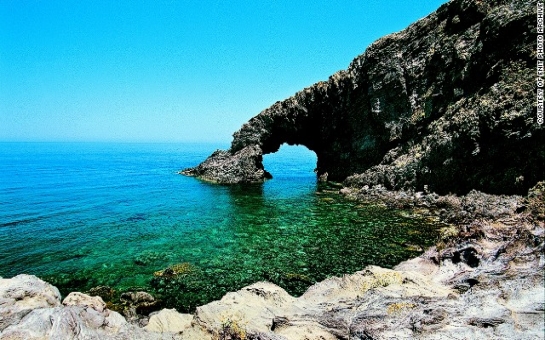Though they once held some of the country's most-wanted criminals, these prison islands are now among its most-wanted vacation destinations.Thanks to their remote locations and a former resident who once acted as a deterrent to visitors, many of these one-time penal colonies are largely unspoiled.Tourists are few, beaches are pristine and flora and fauna abundant.Montecristo, TuscanyThe island that inspired Alexander Dumas's "The Count of Monte Cristo" novel is now as hard to reach as it was once to escape from.A white granite mountain that rises out of the sea, this jewel of the Tuscan Archipelago became a penal colony in the 19th century and later served as a hunting ground for Italian royalty.Wild and uncontaminated, Montecristo is so pristine it's been designated a biogenetic reserve by the European Union and is now home to the island's solitary guardian, some wild goats and a few seals.Getting there: The island allows just 1,000 visits per year and there's a long waiting list, managed by Italy's forest service (+39 056640019).Those that do get permission for day trips will need to hire a boat.Once there they'll get a tour from a state forest guide, taking in a cave and monastery dedicated to hermit Saint Mamilian, who is said to have defeated a dragon here about 1,500 years ago.Pantelleria, SicilyKnown as the Black Pearl of the Mediterranean, this volcanic island is closer to the coast of Tunisia than it is to Italy.Tunisia's scents and flavors are everywhere and most location names on the island are Arabic.The island has changed hands numerous times in the centuries since prehistoric nomads left tombs known as "sesi" scattered across the fertile landscape.Pantelleria has been a strategic Mediterranean hub for the Romans and Phoenician traders and was later occupied by the Spanish, who established a penal colony here.Among the attractions are the white cone-shaped ancient dwellings, known as dammusi.There are also geysers, hot springs and the Elephant Arc -- a gigantic trunk-shaped rock that dips into the cobalt sea.For wine lovers, the island's fertile land produces great bottles such as Passito, a sweet amber-colored wine nicknamed "Pantelleria's gold."Cellar tours are offered by most wine estates. Zinedi (+39 0923914023), one of the biggest, is also a resort and restaurant.Getting there: Alitalia and Blue Panorama run regular air schedules from several Italian mainland cities. Ustica Lines (+39 923 87 38 13) runs daily hydrofoils from Trapani, Sicily during summer months.Capraia, TuscanyCloser to Corsica than mainland Italy, Capraia's volcanic origins can be seen in its reddish Mars-like cliffs.The island, whose name means "goat" in Italian, hasn't housed prisoners since its penal colony closed in 1986, leaving a collection of spooky dungeons that are now on its list of attractions.A single road connects the port to a medieval village where the San Giorgio fort, once the population's shelter during pirate attacks, overlooks the sea.The island is a protected marine park, making it a prime diving destination. The local diving center organizes underwater trips to Cerniopoli, or Groupers' City, an area abundant with fish.The best way to explore is by boat -- especially at sunset -- or along the many trekking routes. There's bathing beneath the Zenobito tower, at Ceppo bay and Cala Mortola, a beach accessibly only by taxi boat.Hotel picks include La Mandola (Via della Mandola 1; +39 0586905300) and Valle di Portovecchio (+39 0586905242), a restyled dungeon.At Il Carabottino (Via San Giorgio), a restaurant in a stone house, the local cook serves up whatever her fisherman husband catches in the net.Getting there: Toremar runs regular ferries from the mainland port of Livorno (+39 199 11 77 33).Santo Stefano, LatiumThis black rock jutting out of waters is topped by a gigantic, abandoned prison fortress built by the Spanish Bourbons in the 1700s.The donut-shaped prison structure is a grim circle of hell. Its cells featured only inward-facing windows to prevent inmates from looking out to sea -- a view that on a clear day features Mount Vesuvius.Thousands of anti-royalists and later, during the last century, anti-Fascists perished here.One of modern Italy's founding fathers and presidents, socialist Sandro Pertini, was shipped here by his enemy Benito Mussolini.Getting here: The isle, part of a protected marine area, is totally uninhabited and off limits except on guided tours from the nearby island of Ventotene.Boats moor at a tiny anchoring point close to "Julia's Tub," a natural wave-carved rock pool that the ancient Romans used as a Jacuzzi.Gorgona, TuscanyItaly's only island still functioning as a prison, Gorgona is covered in typical Mediterranean bush vegetation.Inmates work in vineyards and farms, making wine bottles, cheese, biscuits and pasta.There's a tiny fishermen village with 20 inhabitants, a church and lighthouse.Ancient towers and a fortress offer spectacular views.The isle is part of a so-called Cetacean Sanctuary -- great for whale and dolphin watching.Getting there: Sentieri organizes daily boat trips from the mainland port of Livorno and guided trekking tours to the isle's Cala Maestra cliff and a mosaic-covered Roman villa.Only 75 tourists are allowed each day.There's a small guest house run by prison authorities (+39 0586861032) that offers food and shelter for the night, but usually only in emergencies.Ventotene, LatiumIn local dialect Ventotene's name means "where the wind blows."Lying midway between Rome and Naples, it's the farthest out of the Pontines, a collection of islands off Italy's western coast.Ventotene was established as a prison island in Roman times and was where Emperor Nero shipped his wife Claudia Octavia in the first century on false charges of adultery.Mussolini imprisoned many of his opponents here, including Altiero Spinelli, a political theorist who is considered a founding father of the European Union.The ancient Roman port is still used today but the former prisoners' cells have been transformed into pink, yellow and purple summer houses.It's one of Italy's most popular diving spots featuring barracudas, Roman vases and a sunken war ship. It's also a bird-watching paradise.Top attractions include the Calanave beach, the Roman Villa of Giulia and the ancient fishery.Isolabella (+39 077185027) is a snug family-run hotel restaurant overlooking the sea that serves extraordinary seafood. Breathtaking sunsets can be seen from the Paratagrande resort.Getting there: Laziomer runs a regular ferry service runs from Formia on the mainland.Asinara, SardiniaOnce a penal colony, Asinara is now a protected park populated by more than 650 animal species, including wild albino donkeys that freely graze the land.Bird watching, fishing, sailing and horseback riding are among the island's attractions.Somewhat spartan accommodation is available in a brand new hostel, with restaurant and bar, that has opened in a converted barracks that once housed the prison's guards. (+39 3461737043).Getting there: Private motorboats connect the island to Stintino, a chic fishing village on Sardinia. No cars are allowed on Asinara -- just bikes, although there are organized 4x4 tours.Ponza, LatiumWith its red, yellow and white cliffs, Ponza is renowned for being one of the most beautiful islands in the Mediterranean, and took a starring role in Wes Anderson's movie, "The Life Aquatic."Mussolini was jailed here for several weeks in 1943 after he was overthrown and arrested.The former dictator was sequestered in Pensione Silvia (+39 0771 80075) -- now a cozy sea-front hotel -- that was positively luxurious compared to the conditions he condemned hundreds of his enemies to on other islands.Today, Ponza is an elite destination where Roman vacationers rub shoulders with VIPs, fashionistas and soccer players.Bar Tripoli serves the best aperitifs while Covo Nord Est disco offers wild nights.The best and cheapest way to explore Ponza is by local bus, but tours around the island and its sister isles of Palmarola and Zannone can be arranged in former fishing boats that serve lunch on board. Ponza Diving Center organizes spectacular snorkeling and diving trips.For great seafood there's the family-run Hotel Bellavista (+39 0771 80036), overlooking a white pebble beach.Getting there: Navlib runs regular ferries run from Anzio and Terracina on the mainland. (+39 81 5520763).Pianosa, TuscanyShaped like a flat T-bone steak and covered in fossils and shells, Pianosa fictionally played host to Joseph Heller's paradox-ensared U.S. Army Air Corps bomber crews in "Catch-22."In real life the island's maximum security prison, which closed in 1998, held some of Italy's most feared Mafia criminals.People have been incarcerated on what convicts called "Devil's Island" for centuries -- Emperor Augustus' nephew Agrippa Postumus was jailed and sentenced to death here in 14 A.D.Prisoners still play a role on the island with a handful of supervised convicts involved in running the Hotel Milena (+39 340 0689920).There are guided tours on mountain bike, foot or horseback.Offshore, Pianosa's waters are brimming with fish. Snorkeling and scuba diving are allowed, but only in certain areas.Getting there: Aquavision runs daily boat trips (+39 0565 976022) from nearby Elba Island and Piombino harbor on the mainland.Favignana, SicilyWhen Italy invaded Libya in 1911 thousands of Libyan prisoners were shipped and jailed on this butterfly-shaped island, the biggest of the Egadi isles off the western tip of Sicily.Mostly barren, it's known for its deep caves of calcareous rocks -- and its sunset aperitifs.The tonnara -- a gruesome, traditional tuna-killing festival also known as "mattanza" or the massacre -- was held here until it was banned in 2008, typically attracting hundreds of visitors.There are still fishy attractions -- it's possible to take guided tours of the fish processing plant and a museum (+39 0923925443).For those who can still stomach it after hearing about the tonnara, Restaurant El Pescador (+39 923921035) serves tuna specialties and pasta with sea-urchins.Accommodation includes Hotel delle Cave, a restyled old building with underground gardens, tunnels and pools.Private one-day boat cruises (+39 338 4288863) connect with Favignana's twin isles Levanzo and Marettimo.Getting there: Siremar (+39 0923 545455) and Ustica (+39 0923 873813) operate ferries from Trapani and Marsala.(CNN)Bakudaily.az
Doing time on Italy's prison island paradises - PHOTO
World
19:30 | 25.07.2014

Doing time on Italy's prison island paradises - PHOTO
For centuries Italy has housed its convicts and political enemies on some of the myriad tiny islands that dot its stunning coastline.
Follow us !










